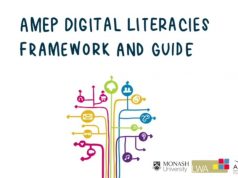by Edwin Creely
Monash University
I recently heard a keynote address in Washington, DC by Jaime Casap of Google Education. To a packed audience, the self-described evangelist of technology in education, extolled the virtues of being proactive about the emergent digitized and online world that Generation Z are part of and fully embedded in. Casap vociferously shared his opinion about the new ways of learning with integrated digital and online technologies (Google’s of course), and how these new ways are, according to him, creating the engaging, equitable and purposeful learning classrooms of the future.
Casap went on to make further claims: first, that the world is changing and becoming rapidly digitized; and second, that education has to respond to this change for the sake of the stakeholders (especially students and their teachers) that depend on it for a working future and for careers and jobs that might not yet even exist. His pro-technology and pro-Google arguments pointed to the deft positioning of Google as an organisation for educational change through and with their suite of digital tools.
Behind the enticing optimism about the working futures of young people linked to digital technologies, is the corporate discourse. Apparently, according to Casap, what might be called traditional work is disappearing, and so Generation Z will need a digitally-based, productive set of problem solving and creative skills and a purposeful focus on entrepreneurship. These skills need to be transferable to any context and are important for the viability of work and careers into the future. Google, as Casap described the company, is here to partner with education and educators, and work within schools and classrooms to bring about these new learning environments that students apparently need in order to acquire these skills and take on the values of entrepreneurship.
Google thus positions itself as the corporate good citizen that will solve world problems and create a future worthy of our children through its freely available set of tools and on-the-ground work with school communities, as well as innovative educational projects such as the Dynamic Learning Project. Furthermore, Google considers that what it does, in providing comprehensive online environment for productivity and communication, is contributing to “digital wellbeing”. This is defined on the company’s website in the following way: “features that help people better understand their tech usage, focus on what matters most, disconnect when needed, and create healthy habits for the whole family”. Thus, Google ascribes their technologies with the ability to promote wellbeing and self-efficacy.
Of course, like every corporate discourse, it is about the pitch: about expansion of its corporate reach, about internationalization, and the profit margins for its shareholders. What appears to be the basis for Google’s strategy is an incisive combination of corporate strategizing with community and educational outreach. According to Andrew Thompson, this strategy is also about product differentiation and market penetration through a focus on intensive growth, built on universality of access and enabling information and digital tools to be one click away.
The irony is that I am writing this article using Google Docs. I own a Chromebook and use Chrome OS, a cloud-based operating system designed by Google, on a daily basis. I have personally bought into the Google digital landscape and thereby ostensibly support the pervasive, inter-country and global reach of this conglomerate, which also includes the universal Android platform for smart phones and tablets.
Google’s digital platforms and its suite of nuanced online tools appear to be highly useable and promote productivity, and are especially useful in educational environments. I can collaborate, connect, share, communicate, create and problem solve on this platform. I hardly use Microsoft Office anymore. I can never get lost because I have Google Maps, and my life is mapped on Google Calendar; and when I want to search for information I just “Google it”. The tools are well constructed, cohesive and intuitive—and growing in scope and capability. I don’t need to go anywhere else, and neither do many universities, schools, and classrooms. I can do everything with Google, and perhaps that universality is core of their corporate stratagem. It may be the case that I have swallowed whole this digital, paperless and integrated ecosystem. Or is it better to suggest that it has swallowed me whole?
And therein lies the problem. I have accepted this ecosystem with little critique, all too easily. I am practical, and because it works well for me, and its apparently free, I have not seen beyond my immediate needs. I have not conceived that what Google practices could be seen as a digital hegemony crafted through the seeming invisibility of their online tools and thus their pervasive penetration into my lifeworld. In this invisibility, that creeps into every area of my life (in writing, emails, browsing, viewing, presentations, events, appointments, contacts etc.), the globally ambitious corporate model, built on neoliberal values, techno-imperialism and the rhetorics of entrepreneurship, thrives. My life and my world, my learning and productivity, can now be held for easy retrieval in a data centre somewhere around the world.
What Jaime Casap did not mention, in a speech crafted seemingly for techno-enthusiasts with a utopian view of technological educational futures, is the dark side of the digital, online world. Such utopianism about technology, learning and creativity has long existed. Indeed, the Apple Corporation has promulgated this ethos for longer than Google. But concerns remain. There is the growing evidence of the deleterious effects of screen time. There is also the significant possibility of technology as creating distraction in classrooms. Technology addiction is also emerging as a significant issue in research. On a systemic level there are problems with social media platforms and social issues such as cyberbullying, as well as national security concerns to do with cybercrime and cybersecurity. In terms of human interactions, Sherry Turkle, in her book, Reclaiming Conversation: The Power of Talk in the Digital Age, claims that social media is seriously disrupting the nature of how humans relate and talk to each other, with negative consequences. Most recently, a digital book by Microsoft, Transforming Education, admits that mistakes with the implementation of technology in classrooms have been made, and that more appropriate and well-designed applications of technology for learning need to be made.
None of these issues (and I have identified just a few), which have a strong basis in academic research, fit neatly with corporate narrative of Google. I propose that their preferred story and dominant discourse is really about a technology and communication company as saviour of the world, and their predominant archetype is that of a Hero that will save Innocents (our students) from this Villain of change (the fluid and moving digitized and online world with changing work practices). It is interesting that the use of the term “evangelist” by Casap suggests a quasi-religious basis to the corporate narrative of Google and their work in the education space.
Despite claims from Jaime Casap in his speech that an education system embracing a Google digital future will enhance equity, there is little evidence that such is the case. Inequality in the so-called first world and the third world is increasing, and the differences between the haves and the have-nots is growing, not diminishing. The truism of the old cliché, “the rich are getting richer and the poor are getting poorer”, is more relevant than ever. Issues of equity and the distribution of resources are palpable in many communities, and even the language of social and educational transformation used by Casap (which sounds somewhat like Paulo Freire) does not diminish the reality of the so-called digital divide. In addition, the phenomenon of university graduates having to accept low paid work because there are no positions in their chosen field is also becoming endemic, and is not likely to improve any time soon.
My next point is a sober one. What is a future (or futures) constructed through the complex, powerful and integrated networks of distributed computing, ones that manage our lives and that can do much of our work? Ray Kurzweil’s, The Singularity is Near, published in 2005, points with some pessimism to such a future, to a future that will not only be constructed by Google but the power of Google with Artificial Intelligence (AI) and advanced robotics and cyborgs. We are seeing some of this already in the self-driving car technologies developed by Google, targeted advertising based on AI, and the development of Augmented Reality (AR) technologies, to name but a few. And in such a future where will the jobs come from? Will they be in IT? Where will be the work, even for those well-educated, with the ability to be adaptive and with problem-solving skills? Certainly there is a revolution afoot in not only the distribution and nature of work and the automation of industry but also in the way work is being reframed around skills sets and the sellability of a person.
The concern in such a future is, in my opinion, not about crazy robots, who will take over the world (The Terminator hypothesis), but powerful transnational corporations that will control or manipulate people’s lives by stealth, use personal data for their own corporate ends (data harvesting), and shape the way humans think about and negotiate their worlds through the imposition of evolving digital ecosystems. While this may seem speculative, there is growing evidence for this commentary based on the corporate behaviour of Google, Facebook, Microsoft and Apple.
Despite The Guardian report that 70% of Americans fear that robots will take over their lives, perhaps the real concern might lay elsewhere: in the uncritical adoption of a brand of technology offered by a corporation and the vast pools of personal data that ensue from that adoption, with possible issues with data privacy. At the same time, I do acknowledge that some tech companies have introduced innovative practices for their employees and thus have enhanced productivity, and that they present a more community-oriented set of values in their corporate model. While this may be the case in some instances, my point is that it is the ubiquity and pervasiveness of these tech companies, and their control of communication and computing systems (often linked to education), that is of concern.
However, I am not promulgating an anti-technology perspective or neo-Luddite position. Indeed, computing, digital technologies and online resources must and should be at the core of learning spaces where students develop skills and competencies. In this regard, I agree with Casap. Capability with technologies is necessary for the futures that students will pursue and for the responsiveness to change that they will need to have in the learning environments and workplaces that they will navigate in the future. However, to be effective and to do what the technology companies claim their technologies can do, such digital technologies must be integrated into classrooms and learning spaces, with thought about design and pedagogies for 21st century learning, and with a critical understanding of what technologies can afford and not afford. The focus must be on the essential future-proofing of students (as far as that is possible).
In addition, learning with technologies should not only be about the skills needed for finding a job and being responsive to future demands, as Casap claims. It should also afford, what John Dewey long ago described as, the development of a civically-minded and life-long learner who has a life, not just a job. To that end, technologies can have an emancipatory and participatory function, as part of life-long learning.
The integration of technologies with teaching and learning, and the use of supporting pedagogies, must be the preserve of policy makers, educators, researchers, and especially classroom teachers at the coalface of implementation and practice. It should not be based solely on a corporation telling educators how they should do their work with technologies, and, most importantly which technologies they should be deploying in classrooms. Google presents a concept of computing and digital communications within education and industry that I see as totalizing, perhaps even deterministic.
Educators need to make choices about what computing and digital platforms, making tools and applications best suit the situated and specific learning needs of their students, employing what is often labelled their Technological Pedagogical Content Knowledge (TPACK). These are the site and discipline specific knowledges linked to and overlapping with pedagogy and involving understandings of what technologies can afford for learning in a particular setting. Such choices are, in my view, the preserve of educators and should be part of the policy positions of the school systems in which they work. It is also important that educators show critical awareness of the power of these choices, even if they are limited choices, and take time to notice what companies such as Google are doing in the education space.
There is little doubt about the usefulness of what Google offers in terms of tools for education and learning. The company has infiltrated education at all levels, and their platforms and tools are ubiquitous. Perhaps, in terms of what many schools and teachers have selected to employ in classrooms, the use of the Google ecosystem has become a fait accompli. However, I still call for caution, teacher agency and criticality, and a rethinking in regard to the selection of appropriate technologies, even though in many cases options may be limited. Indeed, the rhetorics about the efficacy of online tools and digital platforms need to be assessed and the implications for practice understood. If Jaime Casap is right that the future is digital, then educators will need strong awareness of what this means for their students, for their pedagogical practices, but also, most importantly, for their awareness of how digitisation is being corporatized.







